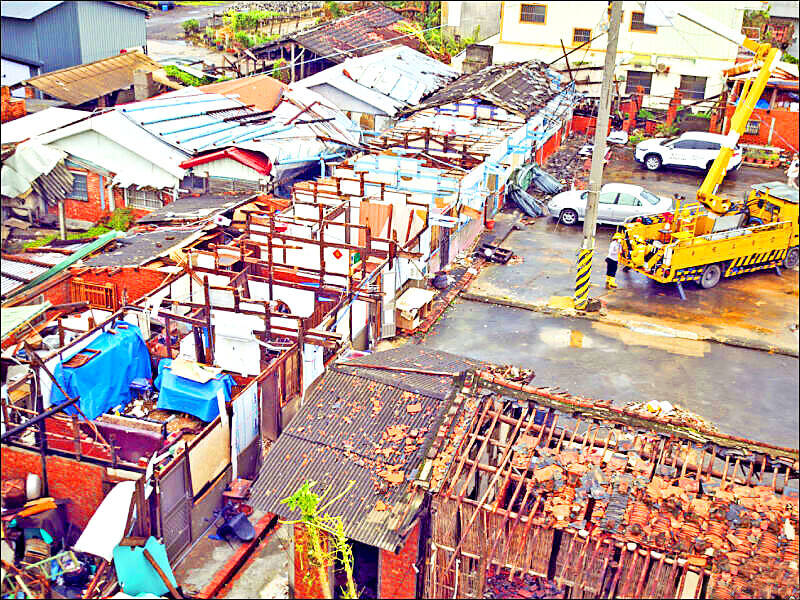The Executive Yuan yesterday approved a budget plan for rebuilding in the aftermath of last month’s Typhoon Danas and extensive flooding, which includes NT$11 billion (US$360.6 million) for improving electricity infrastructure.
The entire budget, with a ceiling of NT$60 billion, would be funded by borrowing, the Cabinet said.
The legislature on Friday last week passed the budget with some changes, raising the ceiling to NT$60 billion from the NT$56 billion initially proposed by the Cabinet, and specifying nine target areas for reconstruction, including agriculture, irrigation, electricity infrastructure and telecommunications equipment.

Photo: Taipei Times
The Cabinet yesterday announced plans to allocate NT$19.1 billion for this year, NT$31.6 billion for next year and NT$9.3 billion for 2027.
The budget would allow the government to allocate NT$10.1 billion for agriculture facilities, NT$11 billion for electricity systems, NT$11.1 billion for irrigation and NT$8.9 billion for roads and traffic, according to the plan.
The Ministry of Agriculture would supervise NT$20.3 billion of the budget, which would be used to subsidize local governments on reconstruction projects concerning agriculture.
The Ministry of Economic Affairs would supervise NT$18.7 billion, which would be used to build a disaster-resilient power grid, subsidize local governments for water supply systems reconstruction and provide relevant aid to hard-hit areas.
The Ministry of Transportation and Communications would supervise NT$6.9 billion, which would be used for roads and tourist attraction reconstruction.
The Cabinet would be in charge of NT$5 billion, which would cover subsidies for the Council of Indigenous Peoples and local governments for hillside reconstruction, subsidies for the National Communications Commission for rebuilding cable TV systems, and a budget for the Public Construction Commission to set up an office to lead reconstruction projects.
The Ministry of the Interior would be in charge of NT$3.8 billion, which would be allocated for urgent maintenance of public facilities, and the reconstruction of roads and bridges in urban areas.
The Ministry of Environment would be in charge of NT$1.6 billion, which would be used for subsidizing local governments for post-disaster environmental restoration projects.
The Ministry of Education would be in charge of NT$400 million for school campus maintenance, while the Ministry of Culture would be in charge of NT$300 million for cultural heritage maintenance.
NT$3 billion would be reserved for unexpected needs, according to the plan.
Additional reporting by CNA

Eight restaurants in Taiwan yesterday secured a one-star rating from the Michelin Guide Taiwan for the first time, while three one-star restaurants from last year’s edition were promoted to two stars. Forty-three restaurants were awarded one star this year, including 34 in Taipei, five in Taichung and four in Kaohsiung. Hosu (好嶼), Chuan Ya (川雅), Sushi Kajin (鮨嘉仁), aMaze (心宴), La Vie by Thomas Buhner, Yuan Yi (元一) and Frassi in Taipei and Front House (方蒔) in Kaohsiung received a one-star rating for the first time. Hosu is known for innovative Taiwanese dishes, while Chuan Ya serves Sichuan cuisine and aMaze specializes

Taitung County is to launch charter flights to Malaysia at the end of this year, after setting up flights to Vietnam and Thailand, the Taitung County Government said yesterday. The new charter flight services, provided by low-cost carrier Batik Air Malaysia, would be part of five-day tour packages for visits to Taitung County or Malaysia. The Batik Air charter flight, with about 200 seats, would take Malaysian tourists to Taitung on Dec. 30 and then at 12:35pm return to Kuala Lumpur with Taiwanese tourists. Another charter flight would bring the Taiwanese home on Jan. 3 next year, arriving at 5:30pm, before taking the

Taiwan High Speed Rail Corp. (THSRC) plans to ease strained capacity during peak hours by introducing new fare rules restricting passengers traveling without reserved seats in 2026, company Chairman Shih Che (史哲) said Wednesday. THSRC needs to tackle its capacity issue because there have been several occasions where passengers holding tickets with reserved seats did not make it onto their train in stations packed with individuals traveling without a reserved seat, Shih told reporters in a joint interview in Taipei. Non-reserved seats allow travelers maximum flexibility, but it has led to issues relating to quality of service and safety concerns, especially during

An exhibition celebrating Taiwan and Japan’s comic culture opened on Saturday in Taichung, featuring a section that explores Taiwanese reproductions of Japanese comics from when martial law limited Japanese representation. “A Century of Manga Culture: An Encounter of Taiwan and Japan’s Youth” held its Taiwan opening ceremony at Taichung’s National Taiwan Museum of Comics after an initial one-month run in Japan’s Kyoto International Manga Museum between May 24 and June 24. Much like the Kyoto exhibition, the show mainly celebrates the comic connection between Taiwan and Japan through late Taiwanese comic book